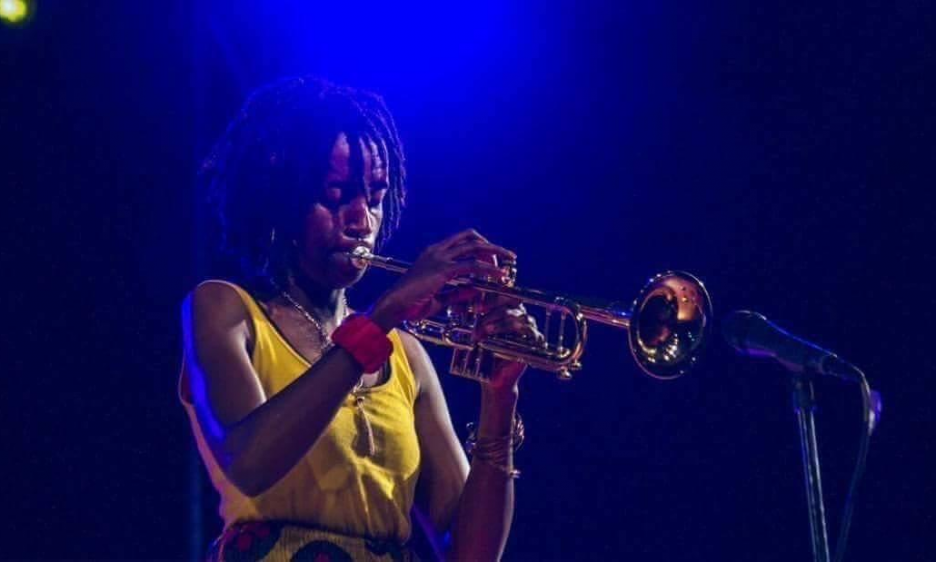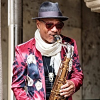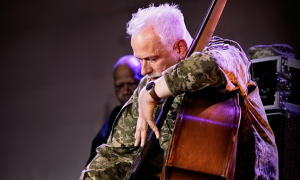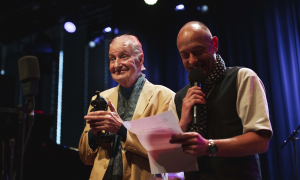Home » Jazz Articles » Profile » Christine Kamau: Delivering Afro-Jazz Power
Christine Kamau: Delivering Afro-Jazz Power

An award-nominated trumpeter, saxophonist, and composer, Kamau has already made a name for herself on the African continent and her reputation as an ambassador for exciting Afro-Jazz is expanding worldwide. She started playing piano at 9 years old and had a solid inclination to and appreciation of music. She began formal music lessons when she was 11 at the Nakuru Players Theatre, a long-established arts centre in Kenya. Surprisingly, trumpet was not her first instrument of study; it was classical piano. Later, she would add saxophone to her arsenal of instrument skills. Doing so, Kamau joined the ranks of jazz greats such as

Benny Carter
saxophone, alto1907 - 2003

Glenn Zottola
saxophone, tenorb.1947

Fela Kuti
saxophone1938 - 1997
Kamau grew up listening to the different genres of music in various languages that were being played on local radio and TV. The music of many diverse artists was popular in Africa at that time. Some of the most noteworthy were groups such as Them Mushrooms, Yvonne Chakachaka, Brenda Fassie, San Fan Thomas, Kanda Bongoman, and many others. The great South African artist,

Hugh Masekela
flugelhorn1939 - 2018
Kamau, leveraging her substantial musical background and desiring to move into the professional world, put together her own band in 2010. However, becoming a professional musician for her was more a series of serendipitous events. She always knew that she wanted to be a musician. However, there were too few mainstream artists in Kenya that had carved out a solo music career playing an instrument for her to have a clear picture of what such a musical career path would entail.
While still studying classical piano, a friend introduced her to an American pianist, John Chapman, who was living in Nairobi and playing jazz with his ensemble. Chapman encouraged Kamau—who was prepping for a piano recital—to switch from classical to jazz during her first lesson after she played George Gershwin's "I Got Rhythm" for him—it being a piece that she had learned off sheet music.
Her jazz studies set her on the trajectory to compose original melodies that were well-suited for horns. That led her to more trumpet-playing. Kamau's defining moment musically was in 2008 when she went to a Berklee College of Music scholarship audition in Durban, South Africa. It was during her brief time there that she became more familiar with the vast repertoire of South African Jazz music by African Jazz pioneers

Zim Ngqawana
saxophone1959 - 2011
Moses Taiwa Molelekwa
b.1973Kamau formed her first band, African People in 2010 and performed numerous gigs with them. The group disbanded in 2013. Her first album, This is for You (Self Produced, 2012) is an instrumental Afro-Jazz album. It was recorded live in studio in Nairobi with Cameroonian music producer, Romeo Kouemeni. Kamau played trumpet on all eight songs and saxophone on "Baba Afrika"—dedicated to Hugh Masakela. American Jazz and African rhythms and melodies play a significant part across the album. All of the main melodies are pentatonic, which is typical of melodies from East Africa. There's Benga guitar -a highly-stylized type of Kenyan guitar playing with high range riffs -on "African People," "Baba Afrika," "Do What you Want;" Rhumba rhythms on "Ulisema," and chained II-V harmonic progressions on "Nakuru Sunshine." Kamau composed all the music and did the arrangements. The album and Kamau's playing in general have an inherent joy, energy, and happiness to them. The music is inviting, rhythmically stimulating, and has a generally upbeat feel.
The BBC featured Kamau in their program, Africa Beats in 2012. It was a 12-part series showcasing emerging musical talent from Africa. Kamau had just organized and held her first ever solo concert at the Kenya National Theatre concert hall when she was invited to be part of the feature. The program was a boost to Kamau's music career. She performed her original composition "Conversations" for the program.
Kamau has also been deeply influenced by American jazz musicians, including four trumpeters she cites in particular whose artistry and to whose trumpet playing had her gravitating:

Lee Morgan
trumpet1938 - 1972

Miles Davis
trumpet1926 - 1991

Freddie Hubbard
trumpet1938 - 2008

Roy Hargrove
trumpet1969 - 2018

Herbie Hancock
pianob.1940

Gerald Albright
saxophone, alto
Marcus Miller
bassb.1959

Kirk Whalum
saxophoneb.1958

Esperanza Spalding
bassb.1984
As a composer, Kamau does not follow a specific process. However, she has written a lot of music on the piano. The piano for her is an important creative step. It allows her to be as open as possible to whatever is heard in her mind and lets it go wherever it leads her creatively.
Kamau has toured extensively. She has performed across East Africa in Rwanda, Tanzania, Ethiopia, Zanzibar, and Uganda, as well as other parts of Africa, including Nigeria, Ivory Coast, and Cameroon. The experience of her playing music with musicians from other cultures fostered her appreciation for intercultural collaborations and connections. She came to the United States in 2019 as a speaker on a music panel at Georgetown University in Washington, DC. Also, trumpeter

Dave Douglas
trumpetb.1963
Christine Kamau's music is a unique, joyous, amalgam of African, rock, jazz, and ethnic components that assuredly will have a universal appeal. This is indeed an International star on the rise.
Tags
Catching Up With
Nicholas F. Mondello
Benny Carter
Glenn Zottola
Hugh Masekela
lee morgan
Miles Davis
Freddie Hubbard
Roy Hargrove
Herbie Hancock
Gerald Albright
Marcus Miller
Kirk Whalum
Esperanza Spalding
Dave Douglas
Comments
PREVIOUS / NEXT
Support All About Jazz
 All About Jazz has been a pillar of jazz since 1995, championing it as an art form and, more importantly, supporting the musicians who make it. Our enduring commitment has made "AAJ" one of the most culturally important websites of its kind, read by hundreds of thousands of fans, musicians and industry figures every month.
All About Jazz has been a pillar of jazz since 1995, championing it as an art form and, more importantly, supporting the musicians who make it. Our enduring commitment has made "AAJ" one of the most culturally important websites of its kind, read by hundreds of thousands of fans, musicians and industry figures every month.








 Buy Now
Buy Now





















